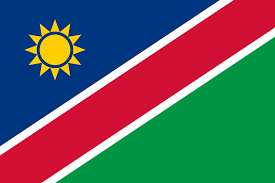Southern African Development Community
Namibia

Namibia
Namibia is situated on Africa’s south-western seaboard. Its neighbouring countries are Angola to the north, Botswana and Zimbabwe to the east and South Africa to the south. The country is bordered by the Atlantic Ocean in the west. The country covers 825,615 km² (almost four times the size of the UK and twice that of Germany).
Following independence, the country was divided into 13 regions as determined by the Delimitation Commission and proclaimed in March 1992. These are Omusati, Oshana, Ohangwena and Oshikoto in the north, Kunene in the North West, Kavango and Caprivi in the northeast, Erongo, Otjozondojupa, Omaheke, Khomas and Hardap in the central part of the country and Karas in the south.
Namibia is a secular state, but over 90% of the population is Christian. The system of government is a multi-party democracy, with checks and balances exercised through the state organs of the executive, legislative and judiciary. General, presidential, regional and local elections are held every five years.
In September 1993, Namibia introduced its own currency, the Namibian Dollar (N$). It is linked to and on par with the South African rand (ZAR), which is also legal tender in Namibia. Most major foreign currencies and traveller’s cheques can be exchanged and international credit cards are generally accepted as a method of payment.
Windhoek serves as the administrative, judicial and legislative capital of Namibia and has a population of approximately 365,000. The capital has a moderate climate and is situated in the central highlands of the country at 1,650 m above sea level. Windhoek gained municipal status in 1909 and was proclaimed a city in 1965. It boasts a well-developed infrastructure and is regarded as a clean and well-functioning metropolis.
Second, only to mining in terms of foreign revenue earned, tourism offers tremendous potential for growth. Different players are involved in tourism. They include investors, private owners, parastatals such as Namibia Wildlife Resorts, the Government, represented by the Ministry of Environment and Tourism, and communities, mainly through Community-Based Natural Resource Management programmes are involved in tourism. Tourism comes in many different guises, and the hospitality business, sightseeing, hunting, and trophy hunting all offer lucrative business opportunities.
There are primary and secondary public schools in all the major towns throughout the country and several private schools in the main centres. Namibia has a number of tertiary institutions, namely the University of Namibia (UNAM), Polytechnic of Namibia, the private International University of Management (IUM), two agricultural colleges and central and regional colleges of education.
Time zones: Namibia falls in the GMT + 2 time zone. The country switches to a different time zone during the winter months: wintertime is set at GMT + 1 and runs from the first Sunday in April to the last Saturday in August.
Titles | Information |
Head of State | H.E. Dr Hage Geingob |
Head of Government (if applicable) | - |
Capital City | Windhoek |
Independence Day | 21 March 1990 |
Official Languages | The official language is English. |
Currency | Namibia Dollar (NAD) N$ 1 = 100 cents) |
Area/Size of the country (km²) | 825,615 |
Natural resources | Diamonds, copper, uranium, gold, silver, lead, tin, lithium, cadmium, tungsten, zinc, salt, hydropower, fish |
Government website link | |
Statistical indicators | Please refer to the latest SADC Statistics Yearbook |
Namibia SADC National Focal Point
Ambassador Penda A. Naanda Executive Director SADC National Contact Point Ministry of International Relations & Cooperation (MIRCO) Government Offices Robert Mugabe Avenue Private Bag 13347 WINDHOEK, NAMIBIA Tel: +264 61 282 9111/2125 Mobile: +264 814 707 133 Fax: +264 61 223 937 Email: headquarters@mirco.gov.na;pnaanda@mirco.gov.na H.E. Mr Asser Kuveri Kapere High Commissioner High Commissioner of the Republic of Namibia Plot 186 Morara Close P.O Box 987 GABORONE, BOTSWANA Tel+ 267 390 2148 Fax: +267 390 2248 Email: namibhc@botsnet.bwgaborone@mfa.gov.na |
Sign in to add your comment.